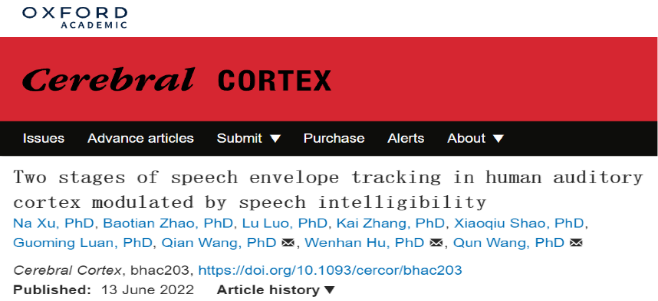Dr. Qian Wang: Two stages of speech envelope tracking in human auditory cortex modulated by speech intelligibility

Abstract
The envelope is essential for speech perception. Recent studies have shown that cortical activity can track the acoustic envelope. However, whether the tracking strength reflects the extent of speech intelligibility processing remains controversial. Here, using stereo-electroencephalogram technology, we directly recorded the activity in human auditory cortex while subjects listened to either natural or noise-vocoded speech. These 2 stimuli have approximately identical envelopes, but the noise-vocoded speech does not have speech intelligibility. According to the tracking lags, we revealed 2 stages of envelope tracking: an early high-γ (60–140 Hz) power stage that preferred the noise-vocoded speech and a late θ (4–8 Hz) phase stage that preferred the natural speech. Furthermore, the decoding performance of high-γ power was better in primary auditory cortex than in nonprimary auditory cortex, consistent with its short tracking delay, while θ phase showed better decoding performance in right auditory cortex. In addition, high-γ responses with sustained temporal profiles in nonprimary auditory cortex were dominant in both envelope tracking and decoding. In sum, we suggested a functional dissociation between high-γ power and θ phase: the former reflects fast and automatic processing of brief acoustic features, while the latter correlates to slow build-up processing facilitated by speech intelligibility.
Original link: https://doi.org/10.1093/cercor/bhac203